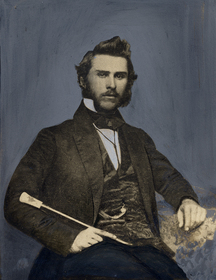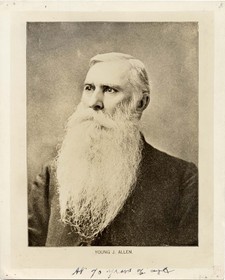Adventures in an undergrad history thesis, or, four months with Young John Allen
The fall semester has ended, and with it, the largest writing project of my life (so far). The function of a senior seminar in history is to prove that you've acquired the skills to read and analyze scholarly work, do research in primary and secondary sources, and develop your own historical argument-- one that contributes to a larger body of work. The final written product needed to be around the 6000-word ballpark; we had four months to become semi-experts on the subjects we were researching, enough time to hopefully learn enough that our own thesis could grow out of the discoveries we made while reading. We read.
For two months we read an array of articles from the Georgia Historical Quarterly, on various topics in Georgia history from the Civil War to the early 1970s. During this time, we were each seeking to become well-read in our respective areas of interest, often guided through the sources by our professor, Dr. David Parker. Then around the end of September, we stopped meeting to discuss articles and hypothetical topics and started using that class time to scour the archives, the library, and the research databases we'd used to much less extent in previous classes: we had to come up with a thesis and flesh it out into a contextual and well-argued history thesis by Dec. 7.
No pressure.

I had arrived in this class at the eleventh hour, signing up about two weeks before the start of fall semester-- and without one last prerequisite class I needed. And in fact it was quite surprising to some of my history major friends that I would end up in a Georgia History senior seminar after spending college studying Asia. But several weeks earlier, in mid-July, Dr. Parker and I had found a way to combine these two seemingly unrelated regions: Young John Allen.
Young J. Allen (yes, Young is his first name, not a kindly prefix) graduated from Emory College when it was just a newly-founded school in Oxford, Georgia, and spent his life as a Methodist missionary in Shanghai, China. He left the United States in Dec. 1859 and remained in the Far East until his death there in 1907. His manuscript collection as well as a large library of his own books reside at Emory University in Atlanta, deeming Allen the subject of a day's trek over to the archives at their Manuscript, Archives, and Rare Book Library (MARBL). What started as a fun mini-project for my summer class (which I also took with Dr. Parker) would have to become my senior thesis topic; when else was I going to find a subject that would so perfectly blend documents in Georgia and three years' worth of my knowledge about Chinese culture, language, politics, and religion? Plus, I was raised Methodist, so I would get to know a little more about that history to boot.
What I would discover was much more than the life, failures, and triumphs of Young J. Allen and the Methodist Episcopal Church, South in China, but simply how enthralling it is to pour over documents that he poured over more than a century earlier. Call me a dork, or a call me a historian, but it felt utterly like touching history. Thankfully, he had somewhat legible handwriting, so I read what I could of his hand-written letters, journals, sermons, and notes for the books he wrote. It felt romantic in the way it seems when you read The Historian and follow a generation of historians across Cold War Europe in search of Vlad Tepes (the prince who inspired tales of Dracula) but also monotonous in the way that you feel work must inevitably be. The result is a happy medium, a wholly rewarding experience and with any luck, worthwhile when you sit down to write.
What did I find?

I found a man inspired by God, baffled by Confucius, and bound to pragmatism. The state of the young Methodist mission was sad when he arrived, and much as he tried to expand it, the American Civil War stole any hope of support or funding from abroad. Allen and his fellow missionary J. W. Lambuth spent nearly a decade working odd jobs to keep themselves afloat. Their families were present in Shanghai too; in fact, Allen had six children with his wife Mary Houston Allen, but only three survived past toddlerhood. By the time funding returned in any sense, Allen had made his own revelation about Chinese society. The non-receptive citizens he'd been preaching to had been anything but successful; but the young men he taught while working at a government school seemed just the type, the upper class families, who may have more influence in a hierarchical Confucian society. Maybe, he decided, reaching these people first and educating them in western subjects (including but not exclusively Christianity) could later influence more people through the top-down formation of their citizenship. These people would not only receive the accompanying western education that Allen considered paramount, but might have more success at reaching the laypeople with whom he'd become so disenchanted.
Allen spent the rest of his life working to varying degrees in education in Shanghai. The Anglo-Chinese College, Shanghai would eventually merge with two others to become Suzhou University in 1901, which had been one of his life's goals. He would also play his hand in journalism and publishing, using his Wan-kuo kung-pao magazine to propel a combination of world and national news, essays on religion, and attacks on Confucian lifestyle. He contributed many translations of tomes on politics and religion, including The Relations Between East and West that was popular among his colleagues and governmental gentry. He wrote several books of his own as well, including one that you can find on Google Books today (by the way, it's in Chinese!). While he did not abandon his evangelistic goals, he expanded those initial plans by adding his social missions to his ambitious strategy to win converts. He wound up somewhere in between fully accepting Confucian society and fully condemning it, and allowed students to learn about Christianity in a non-pressured way. At the end of the day, he saw both mental and spiritual parts of man to be significant.
My thesis touches on this and other aspects of what made Allen a combination of the two worlds of missionary work that grew out of that late nineteenth and early twentieth century, as Americans and other missionaries encountered reluctant natives in the field; a strong camp of traditional strictly evangelical missionaries would go forth alongside the newer social progress proponents. It wound up being around 8000 words (thirty pages double-spaced). I had an embarrassing number of library books checked out from mine and other university libraries across Georgia.
It was an incredible exercise in being a historian. Almost every person in my ten-student class ended up spending at least a few days in an archive somewhere in Georgia, from Emory to Koinonia Farm and in between. What any of these theses will become in the future remains to be seen, but I think we all felt like historians during those months. I am one of the only living experts on Young J. Allen, and I think that's pretty darn cool.
